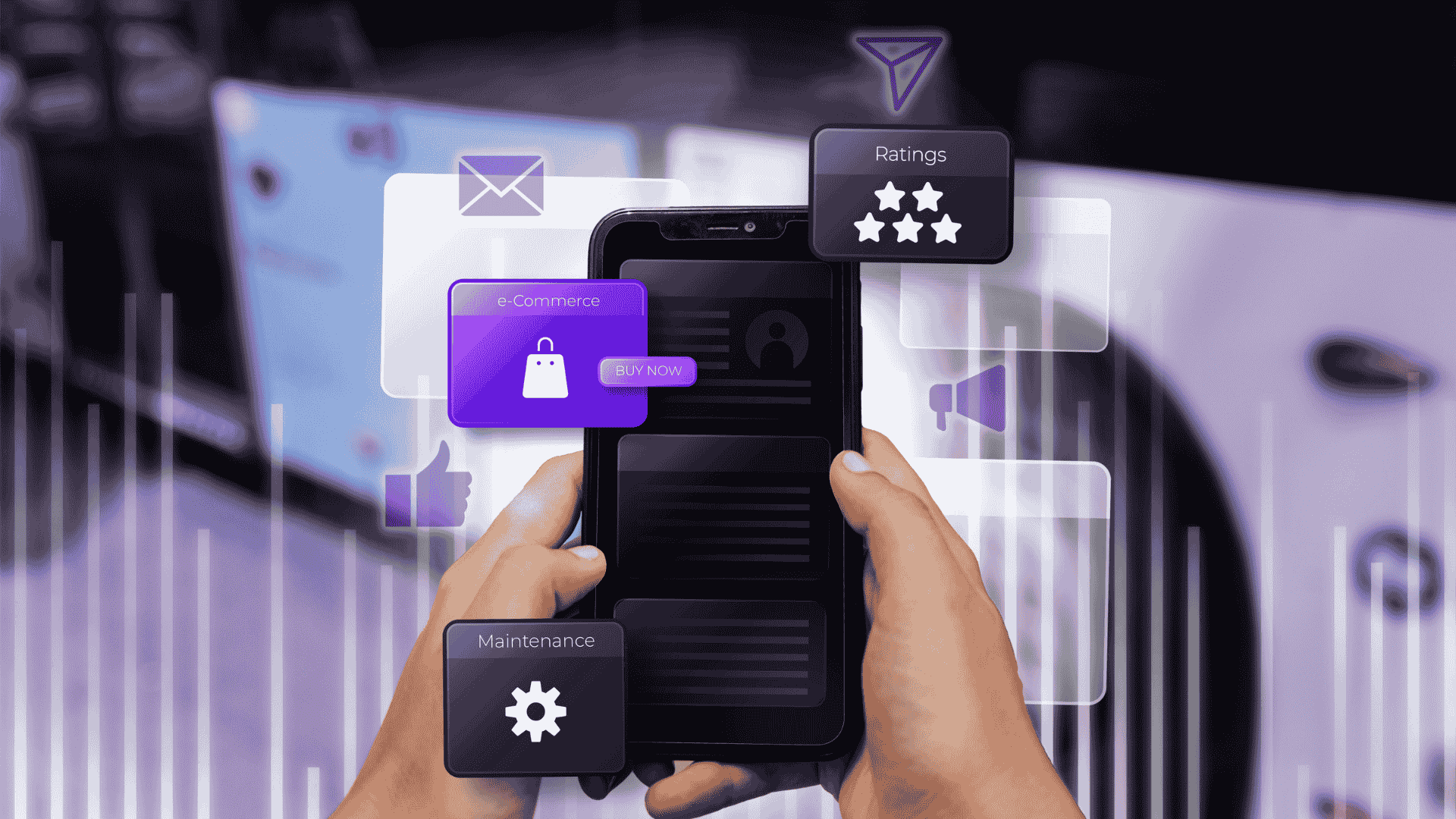In today’s digital age, mobile apps have become essential tools for businesses, driving customer engagement, enhancing operational efficiency, and boosting revenue. Whether you’re a startup looking to break into the market or an established enterprise aiming to expand your digital footprint, developing a robust mobile app is a strategic move. However, one crucial decision that can significantly impact your project’s success is choosing between an in-house team and outsourcing. This blog will explore the pros and cons of both approaches. Let’s begin! Mobile app development is a complex process that requires a combination of technical expertise, creativity, and strategic planning.
From ideation to deployment and maintenance, each phase of app development demands a unique set of skills and resources.
As businesses strive to deliver high-quality apps that meet market demands, the debate between building an in-house team and outsourcing app development continues to grow.
What is In-House Mobile App Development?
In-house mobile app development involves hiring and managing a dedicated team of developers, designers, and project managers within your organization. This team works full-time on your app project, providing direct control over the development process.
What is Outsourcing Mobile App Development?
Outsourcing mobile app development entails hiring external agencies or freelancers to handle your app project. These external experts work independently, leveraging their specialized skills and experience to deliver your app according to your specifications.
Advantages of In-House Mobile App Development
1. Full Control and Direct Communication
One of the primary benefits of having an in-house team is the level of control you have over the development process. Direct communication with your developers allows for real-time updates, quick decision-making, and immediate feedback. This close collaboration can lead to a more cohesive vision and faster iterations.
2. Deep Understanding of Your Brand
An in-house team is more likely to have a deeper understanding of your company’s culture, values, and goals. This familiarity can translate into a product that aligns more closely with your brand identity and business objectives.
3. Long-Term Commitment
In-house teams are typically more committed to the company’s success, as their career growth is tied to the project’s success. This long-term commitment can foster a sense of ownership and motivation, potentially leading to higher-quality work.
Challenges of In-House Mobile App Development
1. High Costs
Building and maintaining an in-house team can be expensive. Costs include salaries, benefits, training, and infrastructure. Additionally, the hiring process can be time-consuming and resource-intensive, further driving up expenses.
2. Limited Talent Pool
Finding skilled developers with the specific expertise required for your project can be challenging. The talent pool may be limited, particularly if your company is located in a region with a shortage of tech professionals.
3. Resource Allocation
Managing an in-house team requires significant resources, including time and effort from management and HR. Balancing these demands with other business priorities can be difficult, potentially impacting the overall productivity of your organization.
Advantages of Outsourcing Mobile App Development
1. Access to Global Talent
Outsourcing provides access to a vast pool of global talent, allowing you to find experts with the specific skills and experience needed for your project. This diversity can lead to innovative solutions and a higher-quality product.
2. Cost-Effectiveness
Outsourcing can be more cost-effective than maintaining an in-house team. You can save on salaries, benefits, and infrastructure costs, and many outsourcing providers offer flexible pricing models to suit your budget.
3. Faster Time-to-Market
Outsourcing companies often have established processes and experienced teams that can expedite the development process. This efficiency can lead to faster time-to-market, giving you a competitive edge.
4. Focus on Core Business Activities
By outsourcing app development, you can free up internal resources to focus on your core business activities. This strategic allocation of resources can enhance overall productivity and business growth.
5. Scalability and Flexibility
Outsourcing offers scalability, allowing you to adjust the size of your development team based on project requirements. This flexibility can be particularly beneficial for startups and small businesses that need to manage costs and resources efficiently.
6. Risk Mitigation
Outsourcing providers often have robust risk management processes in place, including quality assurance, security protocols, and contingency plans. These measures can help mitigate potential risks and ensure the successful delivery of your app.
Challenges of Outsourcing Mobile App Development
1. Communication Barriers
Working with an external team can lead to communication challenges, particularly if there are language barriers or time zone differences. Clear and consistent communication is essential to ensure alignment and avoid misunderstandings.
2. Quality Control
Maintaining quality control can be more challenging when outsourcing. It’s crucial to select a reputable outsourcing provider with a proven track record and establish clear expectations and milestones from the outset.
3. Intellectual Property Concerns
Outsourcing can raise concerns about intellectual property (IP) protection. To safeguard your IP, it’s important to have comprehensive contracts and non-disclosure agreements (NDAs) in place.
Key Considerations When Choosing Between In-House and Outsourcing
1. Project Scope and Complexity
The scope and complexity of your project should be a primary consideration. For highly specialized or complex projects, outsourcing to experts with niche skills may be the best option.
2. Budget and Resources
Assess your budget and available resources. If cost savings and resource efficiency are top priorities, outsourcing may offer the best value.
3. Time-to-Market
Consider your desired time-to-market. If you need to launch your app quickly, an outsourcing provider with established processes and experienced teams can expedite the development process.
4. Long-Term Goals
Align your decision with your long-term goals. If you plan to continuously update and expand your app, an in-house team may provide more consistency and control over the long term.
Making the Decision: In-House vs. Outsourcing
Ultimately, the decision between in-house and outsourcing depends on your unique business needs, goals, and constraints. Both approaches have their advantages and challenges, and the right choice will vary depending on the specifics of your project.
Case Study: Successful Outsourced Mobile App Projects
1. Slack
Slack, the popular collaboration tool, outsourced its app development to a Canadian design firm, MetaLab. The outsourcing partnership enabled Slack to leverage MetaLab’s expertise in user experience design, resulting in a highly successful product that has transformed workplace communication.
2. Alibaba
Alibaba, one of the world’s largest e-commerce platforms, outsourced its initial development to a U.S.-based company. This decision allowed Alibaba to access top-tier technical expertise and rapidly scale its platform, ultimately leading to its global success.
Conclusion
Choosing between an in-house team and outsourcing for your next mobile app project is a critical decision that can impact your business’s success. While both approaches have their merits, outsourcing offers significant benefits, including access to global talent, cost-effectiveness, faster time-to-market, and scalability.
By carefully considering your project’s scope, budget, and long-term goals, you can make an informed decision that aligns with your business objectives.
Ready to bring your mobile app vision to life? Explore the benefits of outsourcing with Integrated IT Solutions, a trusted partner in mobile app development. Contact us today to discuss your project and discover how our expert team can help you achieve your goals. Let’s create something amazing together!
FAQs
Q1. What are the main benefits of outsourcing mobile app development?
Outsourcing offers several benefits, including access to a global talent pool, cost savings, faster time-to-market, scalability, and the ability to focus on core business activities. Outsourcing providers also have established processes and expertise that can enhance the quality and efficiency of your app development.
Q2. How do I choose the right outsourcing partner for my mobile app project?
To choose the right outsourcing partner, consider their experience, portfolio, client reviews, and expertise in your industry. It’s also important to establish clear communication channels, set expectations, and ensure they have robust risk management and quality assurance processes in place.
Q3. What are the potential risks of outsourcing mobile app development?
Potential risks include communication barriers, quality control challenges, and concerns about intellectual property protection. To mitigate these risks, select a reputable outsourcing provider, establish clear contracts and NDAs, and maintain regular communication and oversight throughout the project.
Q4. Can outsourcing save me money on mobile app development?
Yes, outsourcing can be more cost-effective than maintaining an in-house team. You can save on salaries, benefits, infrastructure, and training costs. Additionally, many outsourcing providers offer flexible pricing models that can fit within your budget.
Q5. How can I ensure the quality of my outsourced mobile app project?
Ensure quality by selecting an experienced and reputable outsourcing provider, setting clear expectations and milestones, and maintaining regular communication. Implement quality assurance processes, conduct regular reviews, and provide detailed feedback to guide the development process.
Q6. Is it better to outsource or hire an in-house team for a long-term mobile app project?
The decision depends on your specific needs and goals. For long-term projects with continuous updates and expansions, an in-house team may provide more consistency and control. However, outsourcing can still be beneficial for accessing specialized expertise and managing costs effectively.
Consider a hybrid approach where you maintain a core in-house team while outsourcing specific tasks or phases to external experts.




